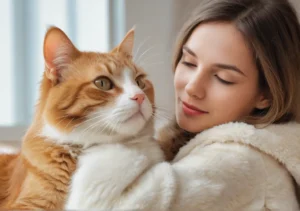Cats are known for their playful and energetic behavior, but have you ever wondered why your feline friend seems to be especially hyper during the day? Understanding the reasons behind this behavior can help you provide the best care for your pet.
Cats are crepuscular animals, meaning they are most active during dawn and dusk. This natural instinct comes from their ancestors, who were hunters most active during these times to catch their prey. As a result, your cat may exhibit bursts of energy and playfulness during the day, as it is a prime time for them to engage in hunting-like behaviors.
Natural instincts at play
Cats are natural hunters, and this instinct plays a significant role in their hyper behavior during the day. With their keen senses and quick reflexes, cats are wired to stalk, pounce, and play. When your cat is zooming around the house, it’s likely trying to satisfy its hunting instincts. Engaging in interactive play sessions with toys that mimic prey can help channel this energy in a positive way and prevent destructive behavior. Providing climbing structures or hiding spots can also give your cat a sense of exploration and keep it entertained.
Environmental stimulation
The environment in which a cat lives can have a significant impact on its activity level and tendency to be hyper during the day. Creating an enriching environment with plenty of toys, scratching posts, and window perches can help keep your cat mentally and physically stimulated. A lack of mental and physical stimulation can lead to boredom and pent-up energy, causing your cat to act out. Consider rotating toys and introducing new ones periodically to keep your cat engaged.
Additionally, ensuring your cat has access to natural light and a view of the outdoors can provide mental stimulation and help regulate its sleep-wake cycle. If your cat is displaying excessive hyperactivity, it’s essential to rule out any underlying medical conditions with a visit to the veterinarian. By understanding and addressing your cat’s environmental needs, you can help foster a calmer and more content feline companion.
Lack of mental stimulation
Is your feline friend bouncing off the walls during the day? It might be due to a lack of mental stimulation. Cats are intelligent creatures that need mental exercises to keep their minds sharp and boredom at bay. Without stimulation, they can become restless and display hyperactive behavior.
So, how can you provide mental stimulation for your cat? Interactive toys that challenge their problem-solving skills, food puzzles that make them work for their meals, or even cat trees with different levels and hiding spots can keep them engaged and mentally stimulated throughout the day. Remember, a stimulated mind is a happy and calm cat!
Physical exercise needs
Have you noticed your cat tearing through the house like a speed racer? This could be a sign that they need more physical exercise. Cats are natural hunters and have a high energy level that needs an outlet. Without enough physical activity, they can become hyperactive during the day.
To help manage your cat’s energy levels, make sure to provide regular play sessions with toys like wand toys or laser pointers to mimic hunting behavior. Encouraging climbing and jumping with cat trees or shelves can also help burn off excess energy. A tired cat is a happy cat, so keep them moving to prevent daytime hyperactivity.
Additional unique insight:
Considering setting up a cat window perch where your furry friend can watch birds and outdoor activity. This serves as mental stimulation and physical activity, as they can jump, stretch, and engage visually with the world outside.
Diet and nutrition
When it comes to understanding why your cat is bouncing off the walls during the day, their diet and nutrition play a crucial role. A cat’s diet affects their energy levels and behavior. Feeding them highly processed foods with high levels of carbohydrates can lead to increased energy spikes and hyperactivity. To help regulate your cat’s energy levels, opt for high-quality protein-packed foods that are specifically formulated for cats. These foods provide the essential nutrients your cat needs to maintain a balanced energy level throughout the day.
Feline enrichment activities
Cat owners, are you tired of your feline friend wreaking havoc during the day? Keep your cat entertained and engaged with enrichment activities and toys. Interactive toys like feather wands and puzzle feeders can help stimulate your cat’s mind and provide physical activity. Consider creating a DIY obstacle course or investing in a cat tree for them to climb and explore. By providing mental and physical stimulation, you can help prevent excessive hyperactivity in your furry friend.
Additional Tip: Incorporate regular playtime sessions into your cat’s daily routine to help burn off excess energy and keep them calm and content throughout the day.
Establishing a routine
To help manage your cat’s energy levels and prevent hyper behavior during the day, it’s crucial to establish a consistent routine. Feeding and playtime should occur at the same times each day. This routine helps regulate your cat’s internal clock and creates a sense of predictability, reducing anxiety and preventing sudden bursts of hyperactivity.
Interesting fact: Cats sleep for an average of 13-14 hours a day, which explains their bursts of energy when they are awake.
Importance of interactive play
Interactive play is essential for keeping your cat mentally stimulated and physically active. Toys that mimic prey, such as feather wands or laser pointers, can help satisfy your cat’s natural hunting instincts and prevent boredom-induced hyperactivity. Rotate toys regularly to keep playtime engaging and exciting for your feline friend.
Establishing a routine is the first step to managing your cat’s hyper behavior, but incorporating interactive play is equally important in keeping them entertained and preventing excessive energy levels during the day.
Additional tip: Provide vertical space for your cat to climb and explore, such as cat trees or wall shelves. This not only offers physical exercise but also mental stimulation, helping to tire out your cat and reduce daytime hyperactivity.
Alex, a passionate animal lover, has experience in training and understanding animal behavior. As a proud pet parent to two dogs and three cats, he founded AnimalReport.net to share insights from animal experts and expand his knowledge of the animal kingdom.




